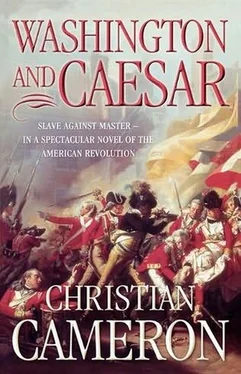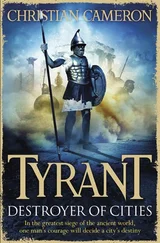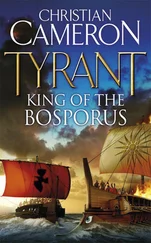Christian Cameron - Washington and Caesar
Здесь есть возможность читать онлайн «Christian Cameron - Washington and Caesar» — ознакомительный отрывок электронной книги совершенно бесплатно, а после прочтения отрывка купить полную версию. В некоторых случаях можно слушать аудио, скачать через торрент в формате fb2 и присутствует краткое содержание. Год выпуска: 0101, ISBN: 0101, Издательство: HarperCollins, Жанр: Исторические приключения, на английском языке. Описание произведения, (предисловие) а так же отзывы посетителей доступны на портале библиотеки ЛибКат.
- Название:Washington and Caesar
- Автор:
- Издательство:HarperCollins
- Жанр:
- Год:0101
- ISBN:9780007389698
- Рейтинг книги:3 / 5. Голосов: 1
-
Избранное:Добавить в избранное
- Отзывы:
-
Ваша оценка:
- 60
- 1
- 2
- 3
- 4
- 5
Washington and Caesar: краткое содержание, описание и аннотация
Предлагаем к чтению аннотацию, описание, краткое содержание или предисловие (зависит от того, что написал сам автор книги «Washington and Caesar»). Если вы не нашли необходимую информацию о книге — напишите в комментариях, мы постараемся отыскать её.
Washington and Caesar — читать онлайн ознакомительный отрывок
Ниже представлен текст книги, разбитый по страницам. Система сохранения места последней прочитанной страницы, позволяет с удобством читать онлайн бесплатно книгу «Washington and Caesar», без необходимости каждый раз заново искать на чём Вы остановились. Поставьте закладку, и сможете в любой момент перейти на страницу, на которой закончили чтение.
Интервал:
Закладка:
Philadelphia looked prosperous. Even on the outskirts, there were new houses and a new tavern being built, and the river was full of ships. Even a Royal Navy blockade couldn’t keep the French out of the Chesapeake or the most ambitious Massachusetts men from trading. The shops were full of goods and the people in the streets were the best dressed in America, but they seemed surly. Perhaps they saw too many uniforms. His treatment was different here and people all but crossed the street to avoid him.
George took a room at an inn near the Congress and went to deliver his dispatches immediately. He knew the contents intimately: reports on the progress of General Sullivan’s expedition against the Iroquois, which George had viewed as a gimcrack strategy; reports on the movement of British ships and men in and out of New York; and a report on the state of the army near New York. Washington was not quite laying siege to the British forces there, but he had them under close observation while he sent many of his troops to face the British attacks on Charleston and other ports in the south.
The entry of France into the war had changed it profoundly and had other effects than just the return of the marquis to his homeland. With France in the war and the loss of Burgoyne’s army at Saratoga, the British were forced to place their main effort in the Caribbean to prevent the loss of their valuable spice islands to the French Navy. Both sides were now concentrating military efforts in the Carolinas, where a fleet avoiding the hurricane season could relax within easy covering distance of the rich islands farther south. And the British had discovered, perhaps too late, the wealth of Loyalist sentiment that existed in the southern back-country.
While armies and fleets skirmished for the possession of anchorages and bases in the south, the war in the north burned on as a series of raids and counter-raids. Loyalists and Indians attacked the Mohawk Valley to cut Washington off from his grain supply, and Washington sent Sullivan to drive the Iroquois from their villages in retaliation. Around New York City, spies and partisans fought a skulking war every day. The dispatches covered these new realities in detail and the logistics that supported them.
He handed his dispatches to a member of the Continental Congress who immediately encouraged him to comment on the papers he bore. George refrained. The army had already survived two periods of intense internal politics and General Washington had made it clear that he didn’t intend to put up with a third. George had little interest in such talk. He requested a signed receipt for the dispatches and found himself in the street, a short walk from his real destination. He was clean and neat, well dressed, and at the end of his duty, and yet he paused, going into a coffee house.
He hadn’t been to the Lovells’ since the day of the looters and despite many letters he feared to put to the test his resolve to ask Mr. Lovell for his daughter’s hand. He might no longer be welcome. Sitting alone in the coffee house, nursing a cup of bitter coffee, he wondered why the idea of being forbidden a house he had entered only once as a guest made so much difference. He thought it might be that he had spent so long imagining the house and its occupants that he felt a more frequent visitor.
To make matters worse, none of his letters had been answered in two months. It was the lack of letters from Betsy that had spurred him to action. Now that he had arrived, he feared to find out the truth. She had married. She had been forbidden to write. Anything seemed possible.
He stood once again in the street outside the coffee house before finally forcing himself to walk the two blocks to the Lovells’, whistling the “Rogue’s March” as he went like a condemned soldier. He walked up the steps briskly, his boot heels ringing against the brick, and tapped on the door with the force of nerves.
He knocked again a few moments later, louder this time. The door of the next house opened and a maid leaned out. She was pretty, and Irish, like most of the maids in Quaker houses. She ducked back as soon as she saw him. He knocked again.
A small boy was standing at the foot of the steps with a wooden hoop. He had been pushing the hoop with a stick, but now he just watched George.
“Are you a real soldier?” he asked.
“I am, lad.”
“May I hold your sword?” he asked, turning his eyes away as he spoke, perhaps ashamed of his own daring. George laughed and came down the steps.
“You can hold the hilt, but I’ll just keep a grip on her. There, isn’t she fine?”
“Oh yes, sir.”
“So, do you live hereabouts?”
“Oh, yes, sir!”
“What’s your name?”
“Alexander Keating, if you please, sir.”
“Well, Alexander Keating, do you know the people who live in this house?”
“I used to know them, sir. Mrs. Lovell made the best orange marmalade and Miss Betsy was the prettiest girl on the street, or so my mama said.”
“Good for your mama. I can’t agree more.” George was wrestling with the construction “used to know”. “Where are the Lovells now?”
“They had to clear out. Mama says the Committee of Safety was wrong to make them go, but Papa says I shouldn’t talk of such things.”
“I imagine he does. Could you take me to meet your mama?”
“Oh, I haven’t been rude, have I, sir?”
“Not at all, Alexander. And you handle that hoop very well indeed. Now march me round to your mama. That’s the boy.”
In minutes, he was seated in another Philadelphia parlor, being fed coffee by the matronly Mrs. Keating. She clucked over the Lovells. It was some moments before George reassured her that he was a friend and not a servant of the committee. Wealthy Philadelphia had developed a distrust of uniforms and George resented it the more for the respect he had felt on his trip south from New York.
“They came several times. I’m not speaking against the government, you understand,” she said, almost in a whisper, and with a look over her shoulder that spoke volumes. “I’m not saying that Mr. Lovell wasn’t a little too loud in his defense of King George. He was arrested, and he paid a fine. An’ most of that fine lined the pockets of the ‘officer’ who arrested him, I have no doubt. My husband would scold me if he heard me talking this way, to an officer an’ all. But a person has to be heard. What’s this ‘freedom’ I hear so much about? The Lovells have none, I believe.”
George sat and drank his coffee silently.
“Oh, I’ve offended you, Captain. I’m so sorry. We’re good Americans, really. But the Lovells had always been our friends.”
“Ma’am, I’m an officer in the Continental Army.” George paused a moment, and then spoke his mind. “I’m a plain man, an apprentice when the war began. I’ve fought since ’75 an’ I reckon I’ll see it through to the end, an’ I don’t have any time for these Committees of Safety. In New York Colony, we had to use the army to suppress some of them. Mostly, they ain’t patriots. They are a vehicle for greedy, cruel men to tyrannize their neighbors. If they was anything else, they’d be in the army.”
He rose and handed her his coffee dish. “I won’t trouble you more, ma’am, with my own seditious talk.” He tore out a sheet from his pocket book and wrote on it in pencil. “This is my address in camp. If the Lovells come back, or you get word of them, would you send to me?”
“Of course I will! I’m a goose! You’re the officer Betsy was always on about, aren’t you?”
George frowned, then smiled. “I reckon I might be, ma’am.”
“Oh, goodness. Oh, of course you want to know where they went. Well, I suppose that all the Tories go to England or to New York. I think that Silas had a place in New York. So you and your camp are closer to the Lovells than I am.” She laughed, a little wildly. She was still very much on edge.
Читать дальшеИнтервал:
Закладка:
Похожие книги на «Washington and Caesar»
Представляем Вашему вниманию похожие книги на «Washington and Caesar» списком для выбора. Мы отобрали схожую по названию и смыслу литературу в надежде предоставить читателям больше вариантов отыскать новые, интересные, ещё непрочитанные произведения.
Обсуждение, отзывы о книге «Washington and Caesar» и просто собственные мнения читателей. Оставьте ваши комментарии, напишите, что Вы думаете о произведении, его смысле или главных героях. Укажите что конкретно понравилось, а что нет, и почему Вы так считаете.












